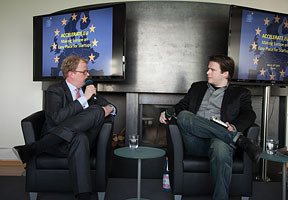A recent conference at the Allianz Forum in Berlin, “Accelerate EU: Making Europe an Easy Place for Startups,” put on by the European Startup Initiative (esi), explored the European startup potential and what can be done to make the continent more attractive to new businesses. Supported by the Allianz Cultural Foundation and organized by four Alumni of the Foundation, the project aims to generate game-changing debate about how to make Europe an easy place for startups.
Since 2013, esi has been facilitating interaction among startups in Europe, to determine the “special sauce” for creating successful startups, and eventually, exits (when founders “cash out” of their startups through IPOs or getting acquired).
In surveys that esi has done, they've found that the time is ripe for encouraging startup activity on the continent. “There is a lot of youth unemployment in Europe,” said esi's Andrea Contigiani,“ and that means that there is a huge crisis in Europe.” But according to Contigiani, this also means opportunity, because of the many highly-educated, but frustrated young people who could possibly contribute to creating successful startups.
There are already some bright spots for startups in Europe, which might be looked to as examples for the rest of the continent. Chris Brown, an American who spent six years in Tallinn, Estonia, told the conference that an early, high-profile startup success in that country has invigorated the country's startup scene, at least psychologically. “Skype created a sense of possibility among the startup community,” Brown said. He is partner at Traction Tribe, which is a Budapest-based accelerator and helps startups.
Skype's founders launched the company out of Tallinn in 2003, and exited twice: once in a $2.6 billion acquisition by eBay in 2005, and again when Skype was purchased by Microsoft, for around $8.5 billion in 2011. Additionally, the country's entrepreneurs tend to have lofty goals, sometimes out of necessity. “Startups in Estonia, because it is small, have to be outward-facing, and think about going international, almost from the very beginning,” Brown said.
But looking past Skype's inspiration and the scene's outward-facing orientation, other European countries might take note of the regulatory steps that Estonia's technocratic government has taken to help startup activity flourish. For example, as one expert told the Economist last year, it takes just five minutes to register a firm in Estonia.
The bottom line
Besides regulatory streamlining, what else will it take to foster startup growth in Europe? Preliminary results from esi's most recent survey, which is still underway but is set to conclude later this year, have found that the biggest roadblock for getting startups off the ground is a lack of financing. Indeed, although European venture capital activity has ramped-up in recent years, startup investment on the continent is still dwarfed by that in Silicon Valley and the rest of the United States.
Kay Mueller, CFO of Allianz Real Estate, suggests that this is because the growth is simply not there, at least not yet. In Europe, Mueller notes that the average return from venture capital is 1.27 percent since the 1980s, compared to the three to four percent seen in the US in recent years, not to mention the astronomical 40 percent or higher seen in the US in the 1990s.
Mueller says that investors tend not to invest in startups because “there's no reason to follow that asset class” when there are other, higher-growth investments available elsewhere.
However, esi's Andrea Contigiani said that there is reason for optimism in the European startup hubs.
“Often, in these ecosystems, we found that everybody knows everybody, and everybody helps each other,” he said. “That is something we found in Europe, and you should not underestimate this. Because Europe can grow something, but it's just starting.”
